Studijní materiál: Liberalism (Diane Panke and Thomas Risse)
Skrýt detaily | Oblíbený- Kvalita:85,3 %
- Typ:Studijní materiál
- Univerzita:Univerzita Karlova v Praze
- Fakulta:Fakulta sociálních věd
- Kategorie:Humanitní vědy
- Podkategorie:Politologie
- Předmět:Mezinárodní vztahy
- Autor:clean.bandit
- Ročník:3. ročník
- Rozsah A4:4 strán
- Zobrazeno:1 376 x
- Stažené:0 x
- Velikost:0,1 MB
- Formát a přípona:MS Office Word (.doc)
- Jazyk:anglický
- ID projektu:9394
- Poslední úprava:09.01.2017
Liberalism (Diane Panke and Thomas Risse)
All classical liberal theories of IR - domestic actors or structures strongly influence the foreign-policy identities and interests of states (as well as their actual behaviour in IR)
Liberal theories (according to Waltz) - tend to be second image approaches (int. outcomes that are located at the level of state) (third image approaches - impact of regimes and int. organizations on unit-level behaviour - neoliberalism)
The most important contribution of classical liberalism to IR theory - democratic states keep the peace among each other (goes back to Kant)
„democratic peace“ - in liberal states, elected decisionmakers are responsible for all decisions by their constituencies, and citizens are cost and risk averse- this prevents republican governments from going to war to easily
After the failure of League of Nations - both theories (peace among democracies or among liberal economies) were regarded as utopian (Carr labelled them as idealist)
All classical liberal theories of IR - domestic actors or structures strongly influence the foreign-policy identities and interests of states (as well as their actual behaviour in IR)
Liberal theories (according to Waltz) - tend to be second image approaches (int. outcomes that are located at the level of state) (third image approaches - impact of regimes and int. organizations on unit-level behaviour - neoliberalism)
The most important contribution of classical liberalism to IR theory - democratic states keep the peace among each other (goes back to Kant)
„democratic peace“ - in liberal states, elected decisionmakers are responsible for all decisions by their constituencies, and citizens are cost and risk averse- this prevents republican governments from going to war to easily
After the failure of League of Nations - both theories (peace among democracies or among liberal economies) were regarded as utopian (Carr labelled them as idealist)


